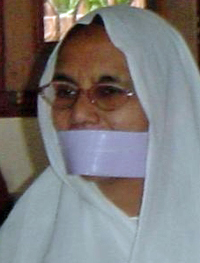In 1951 Acharya Tulsi visited Rajghat Delhi, the memorial of Mahatma Gandhi. Acharya Vinoba Bhave was also there at the same time. The coincidental meeting of two great saints made a new history. They both had a dynamic conversation, about their life and service to the country.
Acharya Shree Tulsi presented the outline of discipline, constitution, management, education-system, and Anuvrat within Terapanth. The synopsis of conversation on Anuvrat is:
Acharya Tulsi: Anuvrat is an essential minimum level of discipline for human life.
Acharya Vinoba Bhave: I do agree with the vows of Anuvrat except that of satya (truth). Non-violence and the like can be considered as small vows and can be accepted partially also. But how can the vow of Satya be followed partially?
Acharya Tulsi: Anuvrat (partial vow for layman) and Mahavrat (Life-long complete vow for a Jain monk) are independent of each other. One can observe any category out of these two as per their strength. Laymen possibly may deceit or tell a lie because of unawareness and carelessness. The aim of vow of satya Anuvrat is to keep a layman away from at least such falsehood which can harm or hurt anyone.
Acharya Vinoba Bhave: You are right, but in my opinion partial truth (satya Anuvrat) is not substantial. Otherwise the zeal or will power to stay honest will be demoralized and untruth will be encouraged.
Acharya Tulsi: In fact, the truth is never ignored in Anuvrat. Non-violence and truth both hold a significant place out of 12 vows for a common man. It's true that for some period the emphasis on honesty was overlooked. But now through Anuvrat movement it is being highlighted. The primary purpose of Anuvrat is to elevate the attitude of honesty.
Acharya Vinoba Bhave: Of course your work is worthy. But bringing change in the attitude of Jain community will be a real success. They do drink filtered water and are careful about not hurting even an ant. But unfortunately they don't care about dishonesty and deceit in the business.
This conversation proved to be the part of the propagation of Anuvrat movement.
Later on April 2,1970 these two saints met again purposefully to share and explore more ideas to work together. In Gopipuri, the productive conversation went for two days on various issues. The key-points of the conversation were:
- Current situation of India
- Nature of non-violence movement
- Instability in politics
- The workers of Anuvrat and Sarvoday
- Growing population of the country and strategy to control it
- Meaning and explanation of the word 'Hindu'
- Practice and exercises to develop celibacy
- Plan to control violent acts
- Collaboration of Anuvrat and Sarvoday
- The 2500th liberation-century of Bhagwan Mahavir
As an outcome of this meeting they came up with some plans to work jointly for Anuvrat and Sarvoday and drafted a declaration letter.
 Sadhvi Vishrut Vibha
Sadhvi Vishrut Vibha
